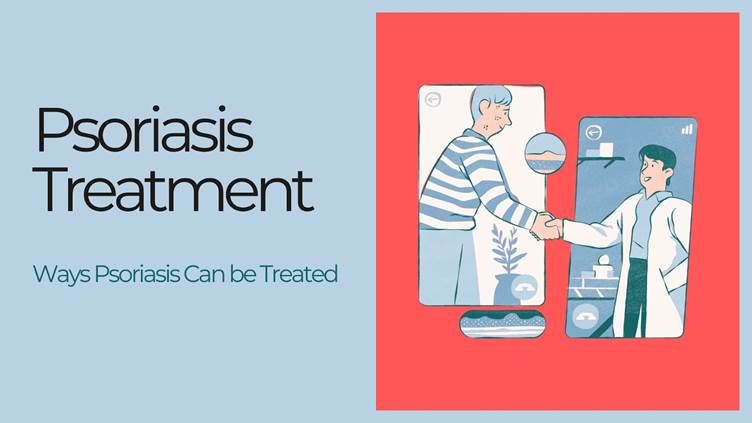Different ways of Psoriasis Treatment aim to slow down the fast growth of skin cells and get rid of the scales. Options include topical treatments like creams and ointments, phototherapy (where light is used), and medicines that are taken by mouth or injected.
The type of treatment chosen relies on how bad the psoriasis is and how well it has responded to past treatments and self-care habits.
Some people may need to try several different medicines or combinations of treatments before they find one that works. Psoriasis often comes back, even after treatment has been good.
Ways Psoriasis Can be Treated:
The section here will aid you in knowing some of the astounding ways you can treat Psoriasis in the most effective ways possible.
On-the-Spot Treatment:
There are different corticosteroids, which are anti-inflammatory methods. Mild corticosteroids, such as hydrocortisone, are often suggested for trouble spots or large areas during flare-ups.
For places that are harder to treat, stronger corticosteroids like triamcinolone or clobetasol may be given. If you use them for a long time, though, your skin may thin, so be careful.
Vitamin D Analogues:
Calcipotriene and calcitriol are two synthetic types of vitamin D that are put on the skin. They can be used alone or with corticosteroids to help slow down the growth of skin cells that are growing too quickly. They work especially well in sensitive places.
Retinoids:
Tazarotene can be bought as a gel or a cream, and it should be used once or twice a day. It works by decreasing swelling and the growth of skin cells. Side effects that happen a lot include skin inflammation and being more sensitive to light.
Calcineurin Inhibitor:
Drugs like tacrolimus and pimecrolimus can help reduce swelling and flaking, especially in places with thin skin or where other cosmetic treatments won’t work. But because they might be dangerous, they shouldn’t be used for long periods.
Salicylic Acid:
This acid is found in shampoos and hair treatments, and it helps people with psoriasis get rid of the scaling that comes with it. It can be used by itself or with other products that go on the skin. Its job is to get the skin ready to take in other medicines better.
Coal Tar:
It is known that coal tar can help with scaling, itching, and redness. It comes in different forms, like oils, creams, and shampoos. But it can get messy, dirty clothes, and smell bad.
Another name for Anthralin is tar-based cream. It helps remove scales, slow down the growth of skin cells, and make the skin softer.
Most people only use it for a short time and then wash it off, but it can be irritating to the skin and leave stains on surfaces.
Use of Light Therapy: Another Alternative to Psoriasis Treatment
Below are some of the points that make light therapy an astounding alternative to light therapy:
- Heliotherapy, or natural sunshine, can help people with psoriasis. Getting some sunlight every day for a short time may help improve symptoms. It’s important to talk to a doctor or nurse about how much sun is safe for you.
- Light therapy (UVB) and coal tar treatment are used together in Goeckerman Therapy. For some people, coal tar makes the skin more sensitive to UVB light, which makes it work better.
- UVB light from an artificial light source can help treat psoriasis spots, psoriasis that covers a large area, and cases that don’t improve with topical treatments. Some short-term side effects could be itchy or inflamed skin.
- Before putting on UVA light, a light-sensitive drug called psoralen is applied to the face. UVA can help people with serious psoriasis more than UVB because it goes deeper into the skin. But it can make you sick and itch in the short term, and it can be dangerous in the long term, leading to skin cancer and more sensitivity to the sun.
- This type of targeted light treatment uses a stronger UVB light source to focus on the skin that is hurt. It takes fewer rounds than regular phototherapy, but it can cause blistering and inflammation.
Medicines (Oral or Injected):
In some cases, small, hard-to-remove psoriasis spots can be helped by injecting corticosteroids right into the affected areas.
- To stop the production of skin cells, you can take pills like acitretin by mouth. But they might have side effects like making your skin dry and your muscles hurt.
- Biologics are medicines that are injected and work on certain parts of the immune system. They work very well for treating moderate to serious psoriasis that hasn’t improved with other medicines. On the other hand, they can come with big costs and risks, like lowering your defense system.
- When taken by mouth once a week, methotrexate helps lower the production of skin cells and inflammation. It might have side effects like stomach aches and tiredness, so you need to get regular blood tests to keep an eye on it.
- Cyclosporine is an immunosuppressant that is taken by mouth and is used to treat serious psoriasis. But you shouldn’t use it for a long time because it raises the risk of getting infections and other health problems.
Tips to Consider for Countering Psoriasis in Your Everyday Life:
Here are some useful tips for dealing with psoriasis in real life:
Gentle Baths:
Take a bath every day with lukewarm water and light soaps that soothe and moisturize. Try not to scrub too hard. Soak in the water for at least 15 minutes with oatmeal, bath oil, or Epsom salts.
Moisturize:
Use a moisturizer every day to keep your face well-hydrated. It’s best to pat your skin dry gently after a bath and put on moisturizer while it’s still a little wet. If your skin is very dry, you might want to use oils or thick ointments because they stay on longer.
Overnight Care:
Before going to bed, put on an ointment-based lubricant and wrap the affected areas in plastic wrap. Take off the plastic in the morning and wash off any scales.
Sunlight:
Some sun contact can help people with psoriasis, but be careful not to get too much. Talk to your healthcare expert about what to do. Wear clothes, a hat, or sunscreen with an SPF of 30 or higher to protect skin that isn’t hurt.
Bottom Line:
There are many strategies to fight psoriasis and regain skin health. From gentle skincare and moisturizing to minimizing triggers and seeking medical advice, psoriasis treatment is multifaceted.
Lifestyle improvements like eating healthily and exercising can improve your health. Remember, everyone’s psoriasis experience is different, so visit a doctor to create a customized treatment plan.
Knowledge and these tactics can help you control psoriasis and live a healthier, more pleasant life.










